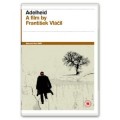| Reviews & Columns |
|
Reviews DVD TV on DVD Blu-ray 4K UHD International DVDs In Theaters Reviews by Studio Video Games Features Collector Series DVDs Easter Egg Database Interviews DVD Talk Radio Feature Articles Columns Anime Talk DVD Savant Horror DVDs The M.O.D. Squad Art House HD Talk Silent DVD
|
DVD Talk Forum |
|
|
| Resources |
|
DVD Price Search Customer Service #'s RCE Info Links |
|
Columns
|
|
|
Adelheid -- Second Run UK Import
Second Run // Unrated // August 23, 2010
List Price: £12.99 [Buy now and save at Co]
The Film:
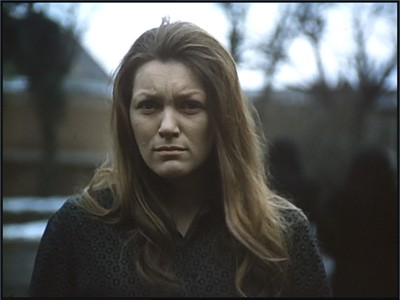 Czech New Wave auteur František Vláčil only directed a handful of feature-length pictures, yet his expressive, almost Bergman-esque style with both Marketa Lazarová and The Valley of the Bees (Údolí včel) makes a quick impression as an existential voice. That's perhaps why Adelheid, Vláčil first soiree in color, is something of a disappointment; his construction of a conflicted post-WWII love affair between a Czech and a German, separated by the language barrier, only intermittently provokes thought within a one-dimensional and contentiously heavy-handed environment. Though the eagerness to absorb another of the artist's work might exaggerate its potency, mostly through a controversial embodiment of post-war German mistreatment, its dramatic flaws are observable even through appreciation for Vláčil's stimulating tactics.
Czech New Wave auteur František Vláčil only directed a handful of feature-length pictures, yet his expressive, almost Bergman-esque style with both Marketa Lazarová and The Valley of the Bees (Údolí včel) makes a quick impression as an existential voice. That's perhaps why Adelheid, Vláčil first soiree in color, is something of a disappointment; his construction of a conflicted post-WWII love affair between a Czech and a German, separated by the language barrier, only intermittently provokes thought within a one-dimensional and contentiously heavy-handed environment. Though the eagerness to absorb another of the artist's work might exaggerate its potency, mostly through a controversial embodiment of post-war German mistreatment, its dramatic flaws are observable even through appreciation for Vláčil's stimulating tactics.
Adelheid first tells the story of Viktor (Petr Cepek), a Czech lieutenant assigned to administrate over a prominent Nazi's mansion in the wake of the war. It's a place with cages waist-deep in water to freeze his captives, expensive brandy tucked behind the books in a library, and filth everywhere. To help in his spruce-up effort, his superior sends along a German POW named Adelheid (Emma Cerná) to clean up, cook, and take care of Viktor's everyday needs, demanding she return back to the camp afterwards. She's a unique choice for the job, though, since the previous Nazi owner of the mansion happens to be her father. Attention quickly shifts to Adelheid as she begins to half-heartedly scrub the floors with a stone-faced scowl spread across her face, yet she still grabs Viktor's attention as he catches glimpses of her bare torso and her covered backside. He develops affection for her, even though they don't speak the same language.
Vláčil creates an intimate human drama out of Adelheid, developing a stern rapport between the weathered-yet-shy Czech soldier Viktor and Adelheid, a subservient but bitter German woman. Our eyes are drawn to Adelheid throughout, subtly but potently performed by Emma Cerná, as she gives a hard, untrusting once-over to any soldier who enter the mansion. As Viktor grows accustomed to her harsh presence, the director allows a very slight juxtaposition to surface between Viktor and Adelheid's inborn personalities and the rough handling of post-WWII Germans under the Czech military -- a controversial depiction. Vláčil contrasts the forced-labor mistreatment with natural human dynamics, showing how Adelheid succumbs to the barking commands of her controllers yet exerts emotional control over Viktor.
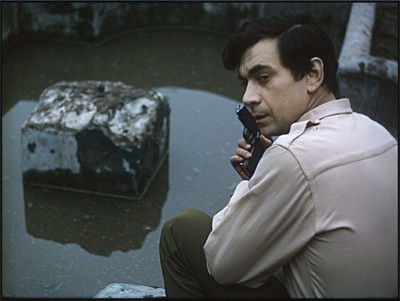 Adelheid's reactions to Viktor's kindness and honorable defense in situations -- especially during an attention-grabbing dinner sequence with other Czech soldiers that suggests his affection-driven protection might be pointless -- mold Adelheid into an intriguing-enough study of interaction, yet there's also the romantic component to bear in mind. Since Viktor isn't the type to bed women from town to town like other soldiers, it seems more like proximity-rooted desperation when his fondness for Adelheid builds amid isolation and his almost voyeuristic spying. In combination with Adelheid's unswerving temperament, the idea of tenderness blossoming between the two never gels into the barrier-defying link Vláčil would like it to be. Instead, it only comes together into a meandering, elusive series of consequences that vainly quench the curiosity generated by the characters.
Adelheid's reactions to Viktor's kindness and honorable defense in situations -- especially during an attention-grabbing dinner sequence with other Czech soldiers that suggests his affection-driven protection might be pointless -- mold Adelheid into an intriguing-enough study of interaction, yet there's also the romantic component to bear in mind. Since Viktor isn't the type to bed women from town to town like other soldiers, it seems more like proximity-rooted desperation when his fondness for Adelheid builds amid isolation and his almost voyeuristic spying. In combination with Adelheid's unswerving temperament, the idea of tenderness blossoming between the two never gels into the barrier-defying link Vláčil would like it to be. Instead, it only comes together into a meandering, elusive series of consequences that vainly quench the curiosity generated by the characters.
As a result, Adelheid is hollow in comparison to Vláčil's other pictures, photographed with a similar poeticism and deliberate focus yet soggy and ill-defined in its attempts at psychosomatic insight. The decisions made by Adelheid are tepid, at best, which transforms the picture into one as cold as the frigid climate in which it's shot. Vláčil does still show his flare for meaningful imagery via cinematography, capturing water-engulfed cages outside the mansion, the intricate frozen branches surrounding dirt walkways, and an overall textured, brown-and-green veneer that looks up-to-date with the modern WWII visual style. But as the eagerness to absorb another entry of the Czech auteur's oeuvre might be satisfied through perceptive visuals and challenging through, Adelheid's dulled edge simply doesn't compel like his other work.
The DVD:
Second Run have offered Adelheid in a standard, clear-cased presentation with the company's signature minimalist artwork. Inside, a Booklet contains production credits for this home video presentation, and a lengthy information piece on František Vláčil composed by Peter Hames. Please note that this DVD is region-free but encoded in the PAL format, so makes certain that your television and/or DVD player are capable of displaying this content before purchasing.
Video and Audio:
After being truly impressed with Second Run's crisp, detailed presentation of The Valley of the Bees, a film several years the senior of Adelheid, it's unfortunate that Vláčil's 1.33:1 color cinematography here doesn't look better -- yet it still gets the job done. Many of the black levels and several of textures employed look fine, but the instability of the print and the insistent presence of dust, dirt, and debris (and a handful of scenes of intense damage) heavily detract from the experience, along with a slurry of smeared, almost tape-level renderings of fine detail. The washed-out colors mostly look appropriate though, and some details within darker sequences can be made out to satisfying degrees, which make Second Run's visualization watchable. For a Czech color film of its age, that's assuredly a compliment.
Audio comes in an equally-serviceable Czech / German Dolby 2.0 Stereo track that wears the film's age on its sleeve. Vocal delivery comes across as thin and coarse through a thin veil of hiss, along with the chorale singing and harpsichord tunes in the score. Very few actual sound effects occur in the film, like the ringing of a doorbell and the gentle splashing of water, and it comes across with about as much clarity as expected considering the dialogue and musical stature. Again, it's a fine-enough track for the film's purposes, but it certainly doesn't mask its age. Optional white subtitles are available in English.
Special Features:
Aside from the textual information in the Booklet, no supplements are available here aside from a Scene Selection.
Final Thoughts:
Those interested in František Vláčil will find some satisfaction in the bleakly poetic visuals and the somewhat compelling human interaction in Adelheid, but it's not of the same caliber as the director's more prominent works. It communicates the harshness behind the controversial topic of German POW mistreatment in an intimate manner, but the murky romantic link at its core fails at giving the story an affective edge. Rent It.
Thomas Spurlin, Staff Reviewer -- DVDTalk Reviews | Personal Blog/Site
 Czech New Wave auteur František Vláčil only directed a handful of feature-length pictures, yet his expressive, almost Bergman-esque style with both Marketa Lazarová and The Valley of the Bees (Údolí včel) makes a quick impression as an existential voice. That's perhaps why Adelheid, Vláčil first soiree in color, is something of a disappointment; his construction of a conflicted post-WWII love affair between a Czech and a German, separated by the language barrier, only intermittently provokes thought within a one-dimensional and contentiously heavy-handed environment. Though the eagerness to absorb another of the artist's work might exaggerate its potency, mostly through a controversial embodiment of post-war German mistreatment, its dramatic flaws are observable even through appreciation for Vláčil's stimulating tactics.
Czech New Wave auteur František Vláčil only directed a handful of feature-length pictures, yet his expressive, almost Bergman-esque style with both Marketa Lazarová and The Valley of the Bees (Údolí včel) makes a quick impression as an existential voice. That's perhaps why Adelheid, Vláčil first soiree in color, is something of a disappointment; his construction of a conflicted post-WWII love affair between a Czech and a German, separated by the language barrier, only intermittently provokes thought within a one-dimensional and contentiously heavy-handed environment. Though the eagerness to absorb another of the artist's work might exaggerate its potency, mostly through a controversial embodiment of post-war German mistreatment, its dramatic flaws are observable even through appreciation for Vláčil's stimulating tactics. Adelheid first tells the story of Viktor (Petr Cepek), a Czech lieutenant assigned to administrate over a prominent Nazi's mansion in the wake of the war. It's a place with cages waist-deep in water to freeze his captives, expensive brandy tucked behind the books in a library, and filth everywhere. To help in his spruce-up effort, his superior sends along a German POW named Adelheid (Emma Cerná) to clean up, cook, and take care of Viktor's everyday needs, demanding she return back to the camp afterwards. She's a unique choice for the job, though, since the previous Nazi owner of the mansion happens to be her father. Attention quickly shifts to Adelheid as she begins to half-heartedly scrub the floors with a stone-faced scowl spread across her face, yet she still grabs Viktor's attention as he catches glimpses of her bare torso and her covered backside. He develops affection for her, even though they don't speak the same language.
Vláčil creates an intimate human drama out of Adelheid, developing a stern rapport between the weathered-yet-shy Czech soldier Viktor and Adelheid, a subservient but bitter German woman. Our eyes are drawn to Adelheid throughout, subtly but potently performed by Emma Cerná, as she gives a hard, untrusting once-over to any soldier who enter the mansion. As Viktor grows accustomed to her harsh presence, the director allows a very slight juxtaposition to surface between Viktor and Adelheid's inborn personalities and the rough handling of post-WWII Germans under the Czech military -- a controversial depiction. Vláčil contrasts the forced-labor mistreatment with natural human dynamics, showing how Adelheid succumbs to the barking commands of her controllers yet exerts emotional control over Viktor.
 Adelheid's reactions to Viktor's kindness and honorable defense in situations -- especially during an attention-grabbing dinner sequence with other Czech soldiers that suggests his affection-driven protection might be pointless -- mold Adelheid into an intriguing-enough study of interaction, yet there's also the romantic component to bear in mind. Since Viktor isn't the type to bed women from town to town like other soldiers, it seems more like proximity-rooted desperation when his fondness for Adelheid builds amid isolation and his almost voyeuristic spying. In combination with Adelheid's unswerving temperament, the idea of tenderness blossoming between the two never gels into the barrier-defying link Vláčil would like it to be. Instead, it only comes together into a meandering, elusive series of consequences that vainly quench the curiosity generated by the characters.
Adelheid's reactions to Viktor's kindness and honorable defense in situations -- especially during an attention-grabbing dinner sequence with other Czech soldiers that suggests his affection-driven protection might be pointless -- mold Adelheid into an intriguing-enough study of interaction, yet there's also the romantic component to bear in mind. Since Viktor isn't the type to bed women from town to town like other soldiers, it seems more like proximity-rooted desperation when his fondness for Adelheid builds amid isolation and his almost voyeuristic spying. In combination with Adelheid's unswerving temperament, the idea of tenderness blossoming between the two never gels into the barrier-defying link Vláčil would like it to be. Instead, it only comes together into a meandering, elusive series of consequences that vainly quench the curiosity generated by the characters. As a result, Adelheid is hollow in comparison to Vláčil's other pictures, photographed with a similar poeticism and deliberate focus yet soggy and ill-defined in its attempts at psychosomatic insight. The decisions made by Adelheid are tepid, at best, which transforms the picture into one as cold as the frigid climate in which it's shot. Vláčil does still show his flare for meaningful imagery via cinematography, capturing water-engulfed cages outside the mansion, the intricate frozen branches surrounding dirt walkways, and an overall textured, brown-and-green veneer that looks up-to-date with the modern WWII visual style. But as the eagerness to absorb another entry of the Czech auteur's oeuvre might be satisfied through perceptive visuals and challenging through, Adelheid's dulled edge simply doesn't compel like his other work.
The DVD:
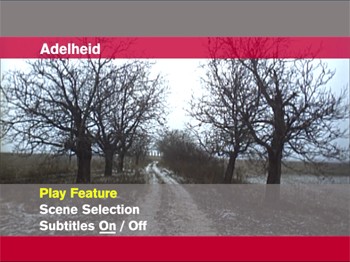 | 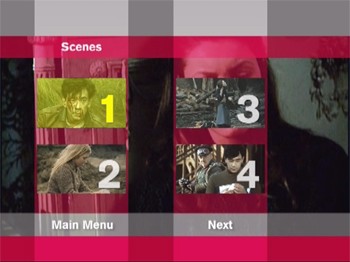 |
Second Run have offered Adelheid in a standard, clear-cased presentation with the company's signature minimalist artwork. Inside, a Booklet contains production credits for this home video presentation, and a lengthy information piece on František Vláčil composed by Peter Hames. Please note that this DVD is region-free but encoded in the PAL format, so makes certain that your television and/or DVD player are capable of displaying this content before purchasing.
Video and Audio:
After being truly impressed with Second Run's crisp, detailed presentation of The Valley of the Bees, a film several years the senior of Adelheid, it's unfortunate that Vláčil's 1.33:1 color cinematography here doesn't look better -- yet it still gets the job done. Many of the black levels and several of textures employed look fine, but the instability of the print and the insistent presence of dust, dirt, and debris (and a handful of scenes of intense damage) heavily detract from the experience, along with a slurry of smeared, almost tape-level renderings of fine detail. The washed-out colors mostly look appropriate though, and some details within darker sequences can be made out to satisfying degrees, which make Second Run's visualization watchable. For a Czech color film of its age, that's assuredly a compliment.
Audio comes in an equally-serviceable Czech / German Dolby 2.0 Stereo track that wears the film's age on its sleeve. Vocal delivery comes across as thin and coarse through a thin veil of hiss, along with the chorale singing and harpsichord tunes in the score. Very few actual sound effects occur in the film, like the ringing of a doorbell and the gentle splashing of water, and it comes across with about as much clarity as expected considering the dialogue and musical stature. Again, it's a fine-enough track for the film's purposes, but it certainly doesn't mask its age. Optional white subtitles are available in English.
Special Features:
Aside from the textual information in the Booklet, no supplements are available here aside from a Scene Selection.
Final Thoughts:
Those interested in František Vláčil will find some satisfaction in the bleakly poetic visuals and the somewhat compelling human interaction in Adelheid, but it's not of the same caliber as the director's more prominent works. It communicates the harshness behind the controversial topic of German POW mistreatment in an intimate manner, but the murky romantic link at its core fails at giving the story an affective edge. Rent It.
|
| Popular Reviews |
| Sponsored Links |
|
|
| Sponsored Links |
|
|
| Release List | Reviews | Shop | Newsletter | Forum | DVD Giveaways | Blu-Ray | Advertise |
|
Copyright 2024 DVDTalk.com All Rights Reserved. Legal Info, Privacy Policy, Terms of Use,
Manage Preferences,
Your Privacy Choices | |||||||









